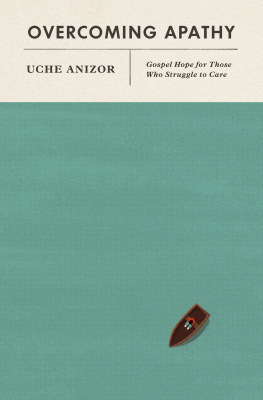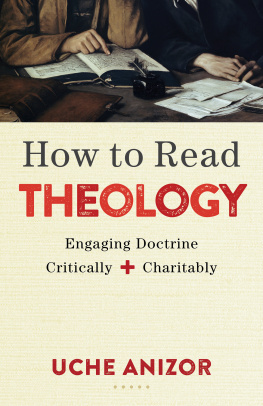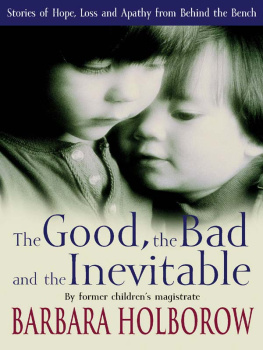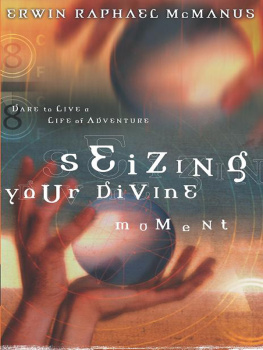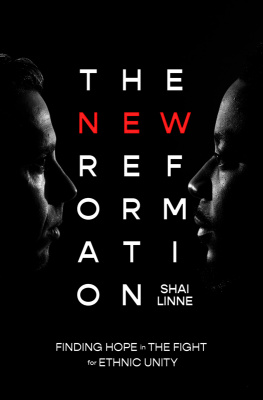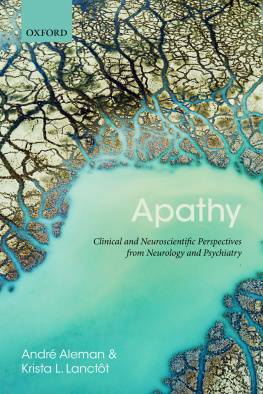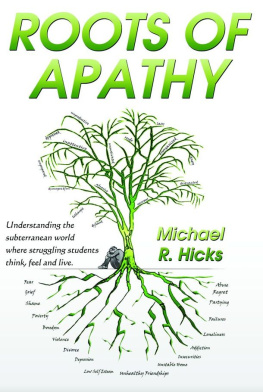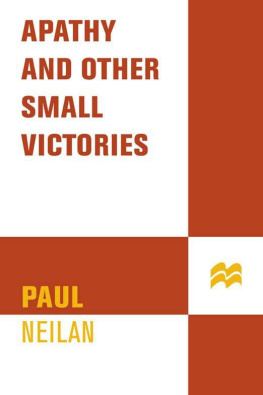Table of Contents
Landmarks
One of the greatest dangers for modern Christians is not apostasy but apathy. In the church, there are not masses of people who are in danger of denying Jesus , but some are in danger of growing bored with him. In Overcoming Apathy , we are met with practical ways for the church to fight back against one of our greatest challenges and we are confronted with the beauty of the gospel and the glory of King Jesus .
J. T. English, Lead Pastor, Storyline Fellowship, Arvada, Colorado; author, Deep Discipleship
Uche Anizor speaks from his experience, encouraging us to recognize and resist apathy, which is so common in our day. Human apathy refers not to healthy rest or godly contentment, but the loss of motivation and the growth of indifference; this condition then often undermines love for God and neighbor. If you feel apathetic, have lost motivation, and wonder if God has anything to say about your indifference, let Anizor point you back toward our good God and his good purposes. Youll see that there is much worth living for because you have been liberated to care about things God cares about.
Kelly Kapic, Professor of Theological Studies, Covenant College; author, Youre Only Human
Overcoming Apathy is an honest invitation to take a tour of our hearts, where apathy often lives. Apathy, which has always been pervasive in fallen hearts, has been popularized by our present age to the point where we dont even notice its presence and power in our lives. Uche Anizor helps us identify and define apathy, disentangling it from other emotions and experiences. With nuance and relevance, he offers seven seed buds from which apathy grows, pairing each with an antidote from Scripture. He moves from philosophical discussion to practical suggestions with ease, offering hope to those who struggle with indifference to that which should most ignite us to love and adoration.
Aimee Joseph, author, Demystifying Decision-Making
Uche Anizor has put his finger on one of the most disturbing and poignant cultural problems in the modern West: apathy . His psychologically insightful, theologically careful, and devotionally rich treatment will help readers both understand and overcome this sickness of the soul. Both individual readers and small groups will benefit from Uches wise diagnosis of the causes and nature of apathy, as well as from his discussion of how we find healing and escape from apathy in the gospel.
Gavin Ortlund, Senior Pastor, First Baptist Church of Ojai, California; author, Finding the Right Hills to Die On
The Cure for Apathy
One of the most enduring and endearing English-language hymns of all time was written in about five minutes. O Love That Wilt Not Let Me Go is a masterpiece penned by George Matheson, a Scottish minister. Matheson was a gifted preacher, theologian, songwriter, and prolific author, having once been invited by Queen Victoria to preach a sermon (which she later had printed). He was also blind, having lost most of his eyesight by his late teen years. He never married, but lived with his sister, who took care of him and aided in his ministry. The verses of Mathesons most famous hymn are familiar to many:
O Love that wilt not let me go,
I rest my weary soul in Thee:
I give Thee back the life I owe,
That in Thine ocean depths its flow
May richer, fuller be.
O Light that followest all my way,
I yield my flickering torch to Thee:
My heart restores its borrowed ray,
That in Thy sunshines blaze its day
May brighter, fairer be.
O Joy that seekest me through pain,
I cannot close my heart to Thee:
I trace the rainbow through the rain,
And feel the promise is not vain
That morn shall tearless be.
O Cross that liftest up my head,
I dare not ask to fly from Thee:
I lay in dust lifes glory dead,
And from the ground there blossoms red
Life that shall endless be.
This song has brought much joy to many, but if you read closely, you can see that it came from a place of hardship. Notice, for example, the beginning of the third stanza: O Joy that seekest me through pain... Matheson himself leaves a brief account about how the hymn originated:
My hymn was composed in the manse [ministers house] of Innellan on the evening of June 6th, 1882. I was at the time alone. It was the day of my sisters marriage, and the rest of the family were staying overnight in Glasgow. Something happened to me, which was known only to myself, and which caused me the most severe mental suffering. The hymn was the fruit of that suffering. It was the quickest bit of work I ever did in my life. I had the impression rather of having it dictated to me by some inward voice than of working it out myself. I am quite sure that the whole work was completed in five minutes, and equally sure that it never received at my hands any retouching or correction.
There is a popular (though never proven) belief that Mathesons severe mental suffering came as a result of his fiance leaving him because she couldnt handle the prospect of being married to a blind man. grief was compounded by the bittersweetness of his sisters wedding.
Regardless of the specific hardship, whats most striking about this song written by this blind and hurting minister is how he comforts himself. Matheson begins each stanza with the truth that Godas love, light, joy, and crossholds on, guides, seeks, and lifts up. This is what Matheson puts in the foreground. This is where his hope lies.
This is where our hope lies.
What does God have to say to those who have a hard time caring about what he says about anything? Is the gospel good news to the apathetic? Matheson offers real help. Nothing describes the apathetic person better than the words weary soul and flickering torch. Yet, Matheson encourages us that God is love that wont let us go and light that reignites the dimming torches of our affections. This blind minister points us to the cure for the spiritually dumb and numb. God is the answer. The gospel is the remedy.
In this chapter, well explore how God addresses apathy and how understanding his work is pivotal for our ongoing battle with it. Well first look at how the gospel is the cure for apathy, which (as we saw in chapter 2) is a form of sickness, bondage, and lawlessness. Well then reflect on how God addresses the seven deadly causes of apathy discussed in the previous chapter.
The Greatest Drama Ever Staged
The gospel is a drama in which God is the lead actor. It is an announcement of what God has done in Christ and in the Spirit. The novelist and Christian apologist Dorothy Sayers calls it the greatest drama ever staged. We find this drama throughout the pages of Scripture, and it centers on one man Jesus of Nazareth. Sayers outlines this story (I give you only a snippet of her breathtaking summary):
Jesus Bar-Joseph, the carpenter of Nazareth, was in fact and in truth, and in the most exact and literal sense of the words, the God by whom all things were made.... He was in every respect a genuine living man. He was not merely a man so good as to be like GodHe was God.
Now, this is not just a pious commonplace; it is not commonplace at all. For what it means is this, among other things: that for whatever reason God chose to make man as he islimited and suffering and subject to sorrows and deathHe [God] had the honesty and the courage to take His own medicine. Whatever game He is playing with His creation, He has kept His own rules and played fair. He can exact nothing from man that He has not exacted from Himself. He has Himself gone through the whole of human experience, from the trivial irritations of family life and the cramping restrictions of hard work and lack of money to the worst horrors of pain and humiliation, defeat, despair, and death. When He was a man, He played the man. He was born in poverty and died in disgrace and thought it well worthwhile.

